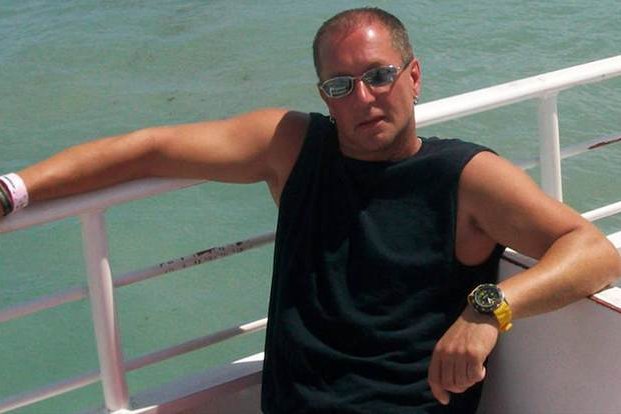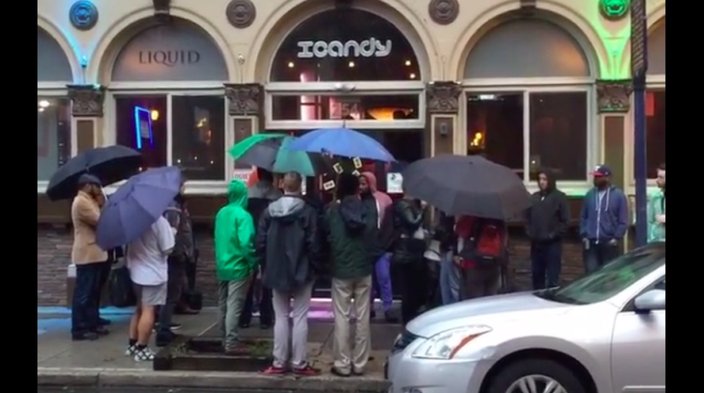
November 03, 2016
 Darryl DePiano/via Facebook
Darryl DePiano/via Facebook
To this day, iCandy nightclub owner Darryl DePiano says he has only seen the video twice. The first was when his husband Michael called him on September 28 to say it was posted on YouTube. Little did he know what kind of reaction would follow.
Growing up in North Jersey in the 1970s, being called “faggot” was par for the course for a gay kid in the closet.
Pretty much anyone who wasn’t a straight, white Protestant dude was the butt of ethnic and religious slurs in the sleepy, blue-collar bedroom communities just outside of Manhattan. As lines were redrawn between neighborhoods, and as “the other” moved closer, like the convenient store owner or the new next-door neighbor, the melting pot didn’t always simmer peacefully. Kids learned to use words they shouldn’t from parents who should have known better. It was a different time people like to say.
But many are still feeling the aftershocks a surprising 40 years later.
Born into a conservative Italian Catholic family a few years before the Stonewall Riot would redraw the direction of gay rights in a dive bar just across the Hudson River, Darryl DePiano didn’t find the courage to come out of the closet until he was in his 40s. His worst fear was that his parents would find out he was gay and that he would be demonized in the straight nightlife and construction businesses that he had built from nothing.
Now, DePiano – at 51, out and married to a much younger man – is facing perhaps the most challenging test since coming to terms with his sexuality a decade ago.
Two months ago, a video surfaced of the iCandy nightclub owner using the n-word– and tensions exploded in the Gayborhood. While some groups, like Black Lives Matter and the Black and Brown Workers Collective, have repeatedly called for DePiano to resign, in his first interview with the media since the fallout, he is very clear on two questions: He will not resign and he will not close the nightclub.
“I’m ready to see what the PCHR comes back with,” says DePiano, referring to the Philadelphia Commission on Human Relations report expected in less than 90 days. The report will likely document any discrimination suffered within the LGBT community, with recommendations about how to proceed, and possibly even legal consequences for those charged with breaking discrimination laws.
From behind his desk in the cluttered fourth floor office at iCandy, DePiano has spent a lot of time rehashing everything that’s happened in the past few weeks, and in many ways he’s become his own harshest critic.
“I realize a word is not just a word,” he says. The misleadingly simple realization may have been a long time coming, but DePiano’s moment of reckoning is undeniable, forced but necessary.
Darryl DePiano
DePiano’s longtime friend and right-hand man, iCandy manager Jeff Sheehan, is busy with paperwork as customers can be seen on video coming into the club for happy hour. Unlike last week when the bar was a ghost town, there are noticeably more people having drinks, including several black patrons. Up until now, it’s been mostly black patrons keeping their distance after the video leaked and the bar was subject to multiple protests.
Feelings seem to be softening, at least for some diehards, like the black neighbor who plays Megatouch while sipping her drink, but others may never step foot into the club again.
DePiano’s own road to atonement began with an apology on Facebook, which some say was too little, too late since it only reached his friends circle. He tried again a few days later, appealing to a crowd assembled for a celebrity event at the packed club back in September. He’s also made a lot of personal phone calls. A lot.
“I’m not minimizing my actions,” DePiano says. Throughout the 90-minute interview he reiterates numerous times that he is sorry for his transgression, and that he is willing to take full responsibility for what he said.
“I personally offended, hurt and disrespected a lot of people. You have to make an apology and be held accountable.” – Darryl DePiano, iCandy nightclub owner
But he says it is important to consider that the words he uttered on video were from three years ago. He says he has grown a lot as a person since then – and before the video surfaced – and has a new husband. But that doesn’t mean the incident doesn’t haunt him or that he may ever be able to explain why he would have even said those words in the first place. Most people don’t get caught saying words they don’t already use in conversation. That’s his conundrum, proving that he’s somehow changed and that he’s truly sorry.
“I still remember the conversation like it was yesterday,” he says. It was past 3 a.m. and he admits that yes, he had been drinking (not uncommon for bar staff after closing). “People were complaining about not getting drink cards,” says DePiano, who was angry. That’s when he said the words that have created a firestorm.
To this day, it actually pains him to watch the video – he has only seen it twice. The first was when his husband Michael called him on September 28 to say it was posted on YouTube. Little did he know what kind of reaction would follow.
Protesters gather outside of the iCandy nightclub in the Gayborhood after the video surfaced.
For many within the black community, the video was proof of what they had been saying for years – that LGBT bars owned by mostly white men have a double standard when it comes to race. Moreover, that people of color are systematically carded more often and wait longer for service, that they are – quite frankly – treated differently from white patrons. Minus the frustrations that had been building for years, it’s uncertain whether the now infamous video would have had the same impact. If there was no animosity between black customers and white business owners, would the anger have been so explosive?
At the very least, the video has given this complex discussion a tangible starting point, even though many of these issues go back more than 30 years, back to when the Gayborhood first became what it would be today.
DePiano’s use of the n-word may be exasperating in 2016, but it’s also not unique to just the Gayborhood, either. The issue has legs that extend deep into the wider culture. That the LGBT community is facing criticism for not doing enough to create a more equal playing field could be attributed to high expectations; this is the same community, after all, that has been progressive on so many other issues.
DePiano said he has received death threats, which make him uneasy about attending public forums.
How could race be such a failure? And where does it take the discussion next? What happens at iCandy and its 45 employees who work there in the aftermath?
The man sitting behind his desk under an Under Armour ball cap is wondering the same thing, feeling responsible and trying to figure out how he can realistically make amends.
“I have grown since then,” repeats DePiano, who is getting ready for 22 hours of sensitivity training in December from Training for Change, the same group he hired to moderate the race forum at the William Way LGBT Community Center last month. In fact, not only is DePiano training, so is his husband and the entire iCandy staff.
“I personally offended, hurt and disrespected a lot of people,” he says. “You have to make an apology and be held accountable.”
DePiano is not a very public person, at least not when it comes to his feelings or his fears. He’s extremely cautious about the media, concerned about being misquoted or misunderstood. And he’s not always eloquent about these issues, inadvertently opening himself up to misinterpretation.
DePiano also doesn’t always speak in simple sound bytes. He can go from one topic to another pretty haphazardly. A conversation about door policies can morph into a plea for trans rights, a question about sensitivity training becomes a forum on fashion. The guy has a lot on his mind, but he comes across as a willing student, readily admitting there are some things he needs to learn to be a better person. He’s a work-in-progress.
For DePiano, the ongoing attention means apologizing for as long as it takes to assure patrons that he’s serious about his penance and that he will make changes.
A surprising revelation, perhaps, is that DePiano, the man known now for his racist comments, had been working with the Office of LGBT Affairs – and Nellie Fitzpatrick, its executive director – to address issues of race in the Gayborhood long before the video surfaced. DePiano submitted both a mission statement and details about the club, including the makeup of the staff, which, in fairness, includes a variety of straight, gay, lesbian and transgender people of all color.
Interestingly, when DePiano was interviewed before iCandy first opened on March 19, 2011, he was adamant then as he is now that he intended to make the club inclusive, and hire staff that would embody all facets of the community.
His high standards have made the fall from grace that much more painful, that much more disappointing, especially for people who have spent money at the club, danced late into the night or shared margaritas on the roof deck. The dichotomy between the man who made these promises six years ago to a hopeful community and the man you hear on the video is glaring. If anyone wonders if he’s paying the price, he is – literally. DePiano has been supplementing the incomes of staff impacted by his words.
“We’ve taken a hit,” he admits. “We’ve had good days and bad days.”
Select promoters in the Gayborhood have pulled events from the club in recent weeks, while others have stayed loyal, including many drag acts. Interestingly, not a single staff member quit amid the scandal. DePiano takes a lot of pride in the low turnover at iCandy for the six years it’s been open.
But for a guy who’s been a bit of a celebrity in the LGBT community, bumping fists with regulars and being a proud sponsor of special events, things are noticeably different now. DePiano said he has received death threats, which make him uneasy about attending public forums. The threats have also made him see the rage firsthand in one of the most palpable forms possible: protest by way of boycott.
After what can only be described as a very long and tense few months for iCandy and other businesses that have been called out for everything from door policies to dress codes, the video, the protests, and the subsequent apologies seem to have put some much-needed context on an issue that certainly isn’t limited to the Gayborhood or Philadelphia.
For that reason, DePiano will have to dig out from the fallout if he expects to bring iCandy back to life, and to gain back trusts that have – without a doubt – been broken.
He’s not naïve. He acknowledges that not everyone will accept his apologies, and that he has likely lost many customers for life. This is not news to him, though it noticeably shakes him as a businessman. Someone in his position might opt to throw in the towel, hide in his office or slink away with his tail between his legs. Not DePiano.
“I’m not going to hide,” he says.
If anything, the experience has come to a head in a way that is inspiring, for better or worse, a lot of discussion about race. It remains a frequent topic of discussion in many Gayborhood bars. For DePiano, the ongoing attention means apologizing for as long as it takes to assure patrons that he’s serious about his penance and that he will make changes – both more obvious ones (like not having a dress code policy) and the internal ones (like becoming a more sensitive human being).
For people of color, the situation runs much deeper than anything most of the bar owners can imagine. Issues that may seem insignificant to the guy doing payroll in the backroom reopen wounds that never seem to have a chance to heal, no matter how much talk and testimony.
A lot of people are tired of having to explain themselves, their color and their expectations of being treated fairly.
For his part, DePiano has high hopes that his personal progress on the issue signals advances within the larger community. He wants the club to be judged not on his choice of words but on the six years of history iCandy has enjoyed in Philly, a town that has dared to take up a conversation that is hard, scary and challenging. One that most communities would – quite frankly – prefer to avoid.
Will it get harder before it gets better? Probably.
Will there be excuses and obstacles that complicate the conversation? Inevitably.
But is the goal to have ultimate transparency? Definitely. To achieve it requires change and, ideally, serious healing. It will take time. But time is vital for a nightclub that relies on drinks and cover charges to pay the basic operational costs.
So how do people even begin to move on? They don’t, at least not yet.
“I don’t want my video to be a hot button,” says DePiano. “I also can’t minimize it and brush it off… Hold me accountable."
 PhillyGayCalendar/via YouTube
PhillyGayCalendar/via YouTube Natalie Hope McDonald/via Instagram
Natalie Hope McDonald/via Instagram